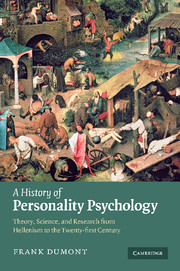 A History of Personality Psychology
A History of Personality Psychology Book contents
- Frontmatter
- Contents
- List of tables and figures
- Preface
- 1 Historical precursors of personality theory
- 2 From illness to wellness models of human nature
- 3 Developmental perspectives on personality: from youth-based to life-span models
- 4 The biology of personality
- 5 Trait theories and the psychology of individual differences
- 6 The puzzle of the self
- 7 Culture and personality
- 8 Gendered personality
- 9 Emotions and reasoning: a definition of the Human
- 10 Taking the measure of the Human: benefits and inherent limitations of personality measures
- 11 Can personality change? The possibilities of psychotherapeutics
- 12 The disordered personality: evolution of nosological systems
- 13 Eight appendices: at the margins of personality psychology
- References
- Author index
- Subject index
10 - Taking the measure of the Human: benefits and inherent limitations of personality measures
Published online by Cambridge University Press: 03 May 2010
- Frontmatter
- Contents
- List of tables and figures
- Preface
- 1 Historical precursors of personality theory
- 2 From illness to wellness models of human nature
- 3 Developmental perspectives on personality: from youth-based to life-span models
- 4 The biology of personality
- 5 Trait theories and the psychology of individual differences
- 6 The puzzle of the self
- 7 Culture and personality
- 8 Gendered personality
- 9 Emotions and reasoning: a definition of the Human
- 10 Taking the measure of the Human: benefits and inherent limitations of personality measures
- 11 Can personality change? The possibilities of psychotherapeutics
- 12 The disordered personality: evolution of nosological systems
- 13 Eight appendices: at the margins of personality psychology
- References
- Author index
- Subject index
Summary
Of all things the measure is man, of the things that are, how they are, and of things that are not, how they are not.
Protagoras (490–420 bce)Antecedents of personality measurement
Humans have always needed to size each other up in view of selecting mates, protecting themselves, engaging in commerce, and furthering their collective and private interests. Such assessment activity never reached the scientifically formal levels that it did in the twentieth century. We know that the Chinese have used formal tests for over 2,000 years for selecting candidates for their civil service, but there was something inherent to contemporary large-scale industrial societies, both Western and Eastern, that necessitated this explosion of interest in instrumentation for measuring humans. As modern society has become a testing society, it will be useful to examine this appetite for testing, which has spawned both a science and an industry.
Virtually no one in our post-industrial society will not have been measured countless times, in mind and body, in the course of his or her growth to maturity. Most of this assessment is done using formal tests. The pioneer of formal testing who is given the greatest credit for launching this social revolution in our modern era is Alfred Binet. He was commissioned in 1904 by the Ministry of Education in Paris to develop a methodology for triaging those children whose lack of success in the public schools of the time suggested that they might be aided by special education programs.
- Type
- Chapter
- Information
- A History of Personality PsychologyTheory, Science, and Research from Hellenism to the Twenty-First Century, pp. 329 - 370Publisher: Cambridge University PressPrint publication year: 2010


